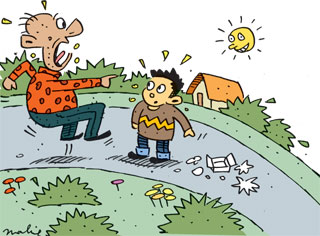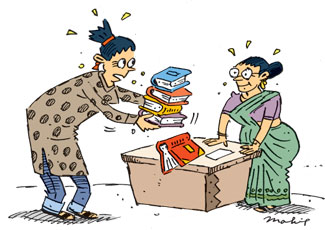|

by
R. S. Karunaratne
Many uses of 'not'
'Not' is used to make sentences or parts of sentences, usually to
make them negative. In spoken English 'not' is contracted to 'n't' after
'be verbs', auxiliary verbs and modal verbs. (These have already been
explained in the Word Power pages)
Note how 'not' is used after be verbs.
It's not my pen.
He is not suitable for the post.
|

You ought not do it again! |
I am not responsible for the mistake.
They are not coming home today.
They were not walking, but running.
'Not' is used after modal verbs.
You should not smoke here.
They could not win the game.
She must not complain to the principal.
We can't go to school today because it's raining.
You ought not do it again!
Sometimes, 'not' is followed by 'ing' verbs to negate the meaning.
Hema sat down not knowing what to do.
A big boy obstructed our way not allowing us to enter the library.
Jane left school not passing any of the exams.
'Not' is used to negate an infinitive.
Try not to worry about it.
The conductor was not willing to give the balance.
'Not' is used to make statements about small quantities.
Not all politicians are corrupt.
Not all men are dishonest.
Frequent combinations
A: Are you going to stay in Bangladesh?
B: Certainly not.
A: Are you coming to Sam's wedding?
|

These books donít belong to me. |
B: May be not.
A: Will it rain today?
B: Probably not because the sky is very clear.
A: Will he win the election?
B: Perhaps not.
A: Are you going to join the fire brigade?
B: Of course not.
A: Have you finished writing the essay?
B: Still not.
There are certain verbs that usually follow 'don't' (do not).
Don't bother, I can look after myself.
Don't worry, everything will be ok.
You don't realise how much we care for you.
You don't know it.
I don't want you to fail the examination.
You don't seem to be a clever student.
You don't deserve that prize!
Don't blame your teacher if you fail the examination.
Don't forget to bring your digital camera.
These books don't belong to me.
I don't remember how I crossed the border.
I don't think you will fail the exam this time.
Set phrases
We are not at all sure whether there will be another world war.
I don't know whether he is honest or not.
(to show a negative possibility)
Cleopatra was not only a queen, but also a beautiful woman.
Activity (use 'not' where necessary.)
1. All men are tall.
2. People live on the moon.
3. Dogs can fly.
4. Shakespeare is a novelist.
5. The Pyramids were built
by the British.
6. Stones melt.
7. He is a nice boy.
8. Sam lives with his aunt.
9. I can sign the cheque.
10. I understand what you say.
******
Key
1. All men are not tall.
2. People do not live on the moon.
3. Dogs cannot fly.
4. Shakespeare is not a novelist.
5. The Pyramids were not built by the British.
6. Stones do not melt.
7. He is not a nice boy.
8. Sam does not live with his aunt.
9. I cannot sign the cheque.
10. I do not understand what you say.
******
Know your
idioms
Idiomatic expressions are forceful, vivid and brief. At the same
time, idioms are the most difficult part of the language. Here are some
commonly used English idioms with three possible meanings set against
each idiom. Tick off (a), (b) or (c) which you think is nearest in
meaning to the given idiom. Check your answers with the key.
1. Reckon without one's host
(a) make plans without consulting the chief person
(b) go on a journey without one's best friend
(c) entertain somebody without one's main host
A close shave
(a) a clean shave
(b) a narrow escape from an accident
(c) a close-up photograph
3. Company manners
(a) behaviour in a company
(b) code of conduct in business establishments
(c) artificial behaviour of unusual politeness
4. Land on one's feet
(a) be lucky
(b) be timid
(c) be honest
5. Break fresh ground
(a) start something new
(b) prepare a new field for cultivation
(c) fill the land
6. To talk nineteen to the dozen
(a) to talk rapidly and continuously
(b) to talk slowly and steadily
(c) to talk in friendly terms
7. Nothing to write home about
(a) having no money to send a letter
(b) not very interesting or exciting
(c) no news to write about
8. Down in the mouth
(a) stuck deep in the mouth
(b) in a happy mood
(c) depressed
9. Face the music
(a) stand up to punishment or one's critics
(b) play in a band of musicians
(c) watch the performance of a group of musicians
10. Steal a march on somebody
(a) take somebody's property secretly
(b) to walk up to somebody fearlessly
(c) do something before somebody and so gain an advantage.
Key: 1(a), 2(b), 3(c), 4(a), 5(a), 6(a), 7(b), 8(a), 9(a), 10(c)
Starters
What are
contractions?
A verb and the word 'not' can be put together to form a contraction.
An apostrophe usually shows that a letter or letters have been
dropped when the contraction was made.
Making contractions is real fun. You just take a verb and the word
'not' and join them. For the letter or letters you are leaving out put
an apostrophe.
Let us now make some contractions.
1. is + not = isn't
2. are + not = aren't
3. was + not = wasn't
4. were + not = weren't
5. does + not = doesn't
6. do + not = don't
7. has + not = hasn't
8. have + not = haven't
9. had + not = hadn't
10. can + not = can't
11. will + not = won't
12. would + not= wouldn't
13. shall + not = shan't
14. should + not= shouldn't
Contractions are often used in spoken English. Do not use them in
compositions, essays and formal letters. |

